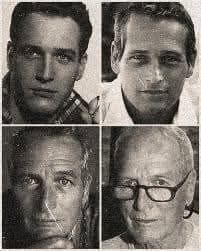On Christmas Eve in 1983, Paul Newman walked into a shelter in Manhattan wearing a plain navy sweater and carrying two wooden crates. Outside, snow was falling hard. Inside, the volunteers were already panicking. They didn’t have enough food to feed the long line of people waiting at the door. Pots were nearly empty, trays of bread were running out, and the weight of failure hung in the air.
Newman set the crates down without a word. Inside were vegetables, jars, and flour from his farm in Connecticut. “Where’s the kitchen?” he asked, rolling up his sleeves. A few people froze when they realized who he was, but Newman didn’t wait for the attention. He went straight to the stove, lit the burners, and started chopping onions as though he had been part of the team all along.
Within an hour, the room changed. Garlic and olive oil filled the air. Bread was rising in the oven. A big pot of tomato soup bubbled on the stove. Newman worked steadily, sweating through his sweater, never slowing down. A young volunteer named Clara remembered him leaning close while she peeled carrots. “If we make it filling enough,” he said, “nobody goes hungry tonight.”
When the doors opened, people shuffled in with thin coats and tired faces. Newman carried bowls to the tables himself. “Merry Christmas,” he told each guest as he set down warm bread rolls. Some recognized him instantly, their eyes wide. Others didn’t know his name, but they felt his kindness.
One man, Luis, broke into tears when Newman placed roasted vegetables in front of him. “I used to have dinners like this with my family,” he whispered. Newman sat across from him and listened. He didn’t talk about movies or fame. He asked about Luis’s life, his family, and how he was holding up. Later Luis told another guest, “He made me feel like I mattered.”
Children followed Newman around the kitchen, laughing as he drew smiley faces in spilled flour. At one table, he cut bread into small pieces for a little girl while her mother looked on in relief. Another woman whispered to a volunteer, “It feels like he’s feeding us at his own table.”
All night, Newman moved between the stove and the dining room. He stirred soup, baked more bread, ladled meals, and kept checking on the people eating. The shelter was warm, full of voices and laughter, a world away from the storm outside. By midnight, more than two hundred people had eaten, many of them twice.
When it was finally over, Newman didn’t leave. He stayed to sweep the floor, stack chairs, and wash dishes. Only when the work was done did he put on his coat. Before he stepped back into the snow, he turned to Clara and said quietly, “The food matters. But being here with them matters more.”
The next morning, there were no cameras, no headlines, no reporters. He had told no one. The only people who remembered were those who had been there that night — the hungry guests, the tired volunteers, and the man in a navy sweater who made a shelter feel like home.✍️
